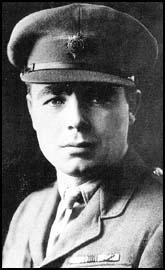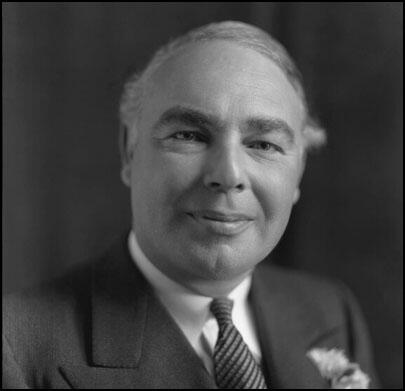Leslie Hore-Belisha

Leslie Hore-Belisha was born in Devonport in 1893. Educated at Clifton College and Oxford University he served as a major in the British Army during the First World War.
Hore-Belisha, a member of the Liberal Party, worked as a journalist and lawyer before entering the House of Commons for Devonport in 1923.
In 1931 Hore-Belisha supported James Ramsay MacDonald and the National Government and became chairman of the National Liberal Party. MacDonald rewarded Hore-Belisha by appointing him Financial Secretary of the Treasury. In 1934 he became Minister of Transport. He successfully reduced the number of road accidents by introducing Belisha beacons at pedestrian crossings, a new highway code and driving tests for motorists.
In 1937 Neville Chamberlain appointed Hore-Belisha as Secretary of State for War. This was a controversial decision as the former holder of the post, Alfred Duff Cooper, was popular with the British armed forces. Hore-Belisha introduced a series of reforms to improve recruitment. Pay and promotion prospects were improved for all ranks, together with more generous pensions. He also introduced modernised barracks with showers and recreation rooms. Married men over the age of twenty-one were now allowed to live with their families.

Hore-Belisha upset the Army Council by replacing three senior members with younger and more flexible men. He also upset Neville Chamberlain by suggesting the introduction of military conscription during his negotiations with Adolf Hitler in 1938. His attempts to persuade Chamberlain to rapidly increase spending on the armed forces was also unsuccessful.
In the House of Commons the Conservative Party MP Archibald Ramsay was the main critic of having Jews in the government. In 1938 he began a campaign to have Hore-Belisha sacked as Secretary of War. In one speech on 27th April he warned that Hore-Belisha "will lead us to war with our blood-brothers of the Nordic race in order to make way for a Bolshevised Europe."
Hore-Belisha had a poor relationship with General John Gort, Chief of the Imperial General Staff. By the outbreak of the Second World War the two men were not on speaking terms.
In May 1939 Archibald Ramsay founded a secret society called the Right-Club. This was an attempt to unify all the different right-wing groups in Britain. In his autobiography The Nameless War Ramsay argued: "The main object of the secret society was to oppose and expose the activities of Organized Jewry... Our first objective was to clear the Conservative Party of Jewish influence." Ramsay continued his campaign against Hore-Belisha and even distributed in Parliament free copies of right-wing magazines that included articles attacking the Secretary of War.
Neville Chamberlain eventually decided to remove Hore-Belisha as Secretary of State for War and appoint him as Minister of Information. Lord Halifax objected, claiming that it was "inappropriate to have a Jew in charge of publicity." In January 1940 Hore-Belisha was sacked as Secretary of State for War.
In 1945 Winston Churchill appointed Hore-Belisha as Minister of National Insurance. However, he lost office when the Labour Party won the 1945 General Election. Leslie Hore-Belisha, who lost his seat in the election, died in 1957.
Primary Sources
(1) Henry (Chips) Channon, diary entry (28th May, 1936)
The sensation of the reshuffle is sending Leslie Belisha to the War Office, which is a staggering appointment and will make or mar his career. Personally, I think he will be successful. His flamboyant personality, his application, his unstinting energy ought to help him and, after all, even if he is a failure, we can cart him, for he is not Conservative, whereas Duff Cooper is.
(2) Herbert Morrison, An Autobiography (1960)
Leslie Hore-Belisha, another Liberal National and former Minister of Transport, who had been appointed Secretary of State for War during the half-hearted revival of our defences when a European war seemed almost inevitable, did not get on very well with Chamberlain on personal grounds. It was also said that he was on occasion difficult to find when he was needed by the cabinet or at the War Office.
Hore-Belisha's greatest fault in his colleagues' eyes was that he had methods and a mind of his own in administration. He did not hesitate to set aside the advice of the generals when he thought it was wrong. There are people who think he was often right when he disagreed with the generals and who have considerable respect for his work as War Minister. He certainly had ability.
(3) Henry (Chips) Channon, diary entry (6th January, 1940)
What is the truth of what happened? There has been an anti-Belisha faction in the House, in the War Office and in the Army for some time. His mania for publicity, his courting of public favour, and his democratic methods of re-organising the Army have made him many enemies: every place seeker disappointed in his hopes, everyone refused a commission, and most of the upper-classes who saw their sons serving in the ranks, were against him: but he went blindly and blandly on with his reforms... Then a cabal was formed of people on the General Staff - but they could think of no way to oust him until they hit on the brilliant idea of roping in, of all people, the Duke of Gloucester, as a professional soldier. He took up the cause and told his brother the King. The Crown decided to intervene dramatically, and sent for the PM... The PM startled by the King's complaint, gave in and that turned the scales. Hitherto, the PM, though aware of the movement, had supported Leslie. On Thursday he sent for him to come to No. 10 - and Leslie, unsuspecting went: they had a long talk during which the PM asked Leslie to accept the Board of Trade. Belisha was staggered, and asked why (evidently he had not believed my too-mildly-worded warning). Then he was told, as gently as the PM could do it, that he must go. Leslie demanded an hour in which to make up his mind, and went for a walk in St James's Park. He could hardly believe what he had been told, and was, of course, quite unaware of the Royal intervention. Later he refused the offer of the Board of Trade and made it plain that he would never serve under Chamberlain in any capacity again, because he no longer trusted him. How could he ever be sure that the PM would not throw him over again ? There was some bitterness, but no actual scene, and Belisha agreed not to make a statement, not to attack the Government.

